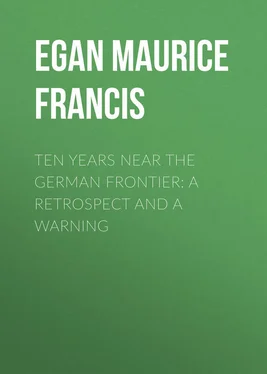Maurice Egan - Ten Years Near the German Frontier - A Retrospect and a Warning
Здесь есть возможность читать онлайн «Maurice Egan - Ten Years Near the German Frontier - A Retrospect and a Warning» — ознакомительный отрывок электронной книги совершенно бесплатно, а после прочтения отрывка купить полную версию. В некоторых случаях можно слушать аудио, скачать через торрент в формате fb2 и присутствует краткое содержание. Жанр: foreign_antique, foreign_prose, на английском языке. Описание произведения, (предисловие) а так же отзывы посетителей доступны на портале библиотеки ЛибКат.
- Название:Ten Years Near the German Frontier: A Retrospect and a Warning
- Автор:
- Жанр:
- Год:неизвестен
- ISBN:нет данных
- Рейтинг книги:5 / 5. Голосов: 1
-
Избранное:Добавить в избранное
- Отзывы:
-
Ваша оценка:
- 100
- 1
- 2
- 3
- 4
- 5
Ten Years Near the German Frontier: A Retrospect and a Warning: краткое содержание, описание и аннотация
Предлагаем к чтению аннотацию, описание, краткое содержание или предисловие (зависит от того, что написал сам автор книги «Ten Years Near the German Frontier: A Retrospect and a Warning»). Если вы не нашли необходимую информацию о книге — напишите в комментариях, мы постараемся отыскать её.
Ten Years Near the German Frontier: A Retrospect and a Warning — читать онлайн ознакомительный отрывок
Ниже представлен текст книги, разбитый по страницам. Система сохранения места последней прочитанной страницы, позволяет с удобством читать онлайн бесплатно книгу «Ten Years Near the German Frontier: A Retrospect and a Warning», без необходимости каждый раз заново искать на чём Вы остановились. Поставьте закладку, и сможете в любой момент перейти на страницу, на которой закончили чтение.
Интервал:
Закладка:
In 1907-8 King Frederick VIII. gave occasionally a dinner on Sunday night at the country house not far from Copenhagen, Charlottenlund, when it was hard to keep from turning one's back to a royalty, – there were so many crowned heads present. There, if Queen Alexandra made it plain that she wanted to speak to you, you, approaching her, found yourself with your back to the King of Greece or to King Haakon of Norway, or to the Queen of Denmark herself!
Times have changed; the circumstances which made the late mother of King Frederick so powerful in keeping 'the family' together can never occur again.
Of the four daughters of the late King Frederick, two married, one in Sweden and the other in Germany. The Danish princess, Louise, who became the wife of His Serene Highness, Prince Friedrich Georg Wilhelm Bruno of Lippe-Schaumbourg, is to the Danes a lovely and pathetic memory. They say that he treated her badly, that the bride fled from him to the protection of her parents, whom they censured for not taking her home before her death. The criticism – which even found expression in public disapproval – was unreasonable, but the mass of the Danes is always more generous than just in the treatment of its children. In 1908-9, to mention the name of Prince Friedrich was to commit a social error; he was taboo; every mother in Denmark was furious at the stories told of his injuries to their dead Princess Louise.
Princess Ingeborg, born in 1878, married the 'blue Prince,' Charles of Sweden, Duke of Westgothia. King Frederick VIII., after the failure of the German marriage, kept his two other daughters, Thyra and Dagmar, in the background. He was a very sympathetic king, and he liked to talk of ordinary affairs; he was truly much interested in the life immediately around him. 'I do not encourage princes in search of wives,' he said; 'I shall keep my daughters with me.' Princess Thyra – one cannot conceal the age of princesses, while there is an Almanach de Gotha – was born on March 14th, 1880, and Princess Dagmar on May 23rd, 1890. The Princess Thyra is of the type of her beautiful aunt, the Queen Mother of England; like her aunt, she looks much younger than her age; the Princess Dagmar has the quality of this royal family, of always seeming to be ten years, in appearance, younger than they are. They were our near neighbours for ten years, and my wife often threatened to marry them to nice 'Americans'; – King Frederick, considering this impossible, gave his consent at once! He often brought them in to tea, and they met 'nice Americans,' and seemed to like them very much.
The Emperor William – who wanted to be called the Emperor of Germany rather than the German, or Prussian Emperor, as we always called him – showed no affection for his Danish relatives; but, nevertheless, he did not underrate the value of Denmark as the 'whispering gallery' of Europe.
In the old palace of Rosenborg, in Copenhagen, there is a room so arranged that, by means of a narrow tunnel in the wall, Christian IV., a contemporary of Queen Elizabeth, could hear what his guards said, in their cabinet, at all hours of the day and night. 'There is a similar room at Potsdam,' a Dane said to me; 'William always listens when he is not speaking!' William knew what the Danes said of the German marriage; his plans did not lie in the way of annexing either of the Danish princesses, whose sympathies were not with the despoilers of the country; he had his eyes on the son of their aunt, the Duchess of Cumberland, who was later to marry his daughter. But royal marriages had ceased to strengthen or weaken Denmark; the Archduke Michael of Russia 'hung around' for a time; others came; but King Frederick walked out with his daughter, Princess Thyra, both evidently content. Princesses are expected to make marriages of 'convenience,' but Princess Thyra, like her aunt, Princess Victoria of England, does not seem inclined to make a marriage of that kind. Princess Dagmar was too young to be permitted to expect suitors, when her father lived; and the Princess Margaret, daughter of Prince Valdemar, brother of King Frederick, for whom, it was said, overtures had already been made on behalf of the growing Prince of the House of Saxony, was younger still. Denmark had ceased to be a marriage market of kings; the futility of attempting to cement international relations by royal alliances was becoming only too evident. Prince Valdemar, brother of King Frederick, had refused more than once a Balkan kingdom, and, when consulted by very great personages as to a marriage of his oldest son to the Grand Duchess of Luxembourg, had answered, like his brother Frederick, that he preferred 'to keep his children at home.'
Nevertheless, the previous royal marriages and the fact that nearly every diplomat at Copenhagen was a favourite with his sovereign, sent by a relative of the court at home to please the court at Copenhagen, gave the post unusual prestige, and made 'conversations' possible there which could not have taken place elsewhere. The court circle, when one had the entrance, but not until then, was like that of an agreeable family. Nearly every minister at Copenhagen was destined for an embassy. When my predecessor, Mr. O'Brien, was translated to Tokyo, our prestige was enhanced; the Danes believed that our country but followed the usual precedent, according to which their French M. Jusserand had been made ambassador at Washington. Even the United States had begun to understand the importance of the post; and it was in the line of diplomatic usage when it was rumoured that I had been offered Vienna. I met, too, ministers to Copenhagen who considered themselves, because of royal patronage, ambassadors by brevet, and who exacted 'Excellency,' not as a courtesy but a right!
Mr. Whitelaw Reid wrote to me, speaking of my post as a 'delightful, little Dresden china court'; the epithet was pretty, and there were times, when the young princesses and their friends thronged the rococo rooms of the Amalieborg Palace, that it seemed appropriate. When the processions of guests moved up the white stairs between the line of liveried servants, some of them with quaint artificial flowers in their caps, the sight was very like a bit out of Watteau.
Bismarck had not looked on Denmark as a negligible country; he knew its importance; there was a legend that one of the few persons he really respected and feared in Europe was the old Queen Louise. Besides, he knew the history of Denmark so well, that he chose to correct the supposed taint in the blood of the Hohenzollerns by choosing an Empress for William II. of 'the blood of Struense.' This Struense, the German physician who, through the degeneracy of Christian VII., had in 1770 become the guide, the philosopher, and – it was said – the more than friend of his Queen, Caroline Matilda, tried to be the Bismarck of Denmark; but he was of too soft a mould, – the disciple of Rousseau and Voltaire rather than of Machiavelli and Cæsar Borgia. He was drawn and quartered, after having confessed, in the most ungentlemanly way, his relations with the queen, sister of King George III. of England.
It is probable that part of the Emperor's dislike to Bismarck was due to that ' mot ' of the Iron Chancellor about the royal marriage he had helped to make. It was the kind of ' mot ' that William would not be likely to forget. It is an axiom of courts that the child of a Queen cannot be illegitimate. Even the Duke de Morny, son of Queen Hortense of Holland, bore proudly 'Hortensias' in the panels of his carriage during the Third Empire in France. Nevertheless, though Queen Caroline Matilda had died, in her exile at Celle, protesting her innocence, it was understood that Struense was the father of the supposed daughter of Christian VII., the daughter who married into the House of Slesvig-Holstein-Sonderburg-Augustenburg. Her descendant, the Princess Augusta Victoria Frederika-Louisa-Feodora-Jenny married the Emperor William II., on February 27th, 1881, at Berlin. It was a love match – at least on the side of the empress. One of the ladies in waiting at the German court once told my wife that the famous Augusta Victoria rose – the magnolia rose of our youth – was always cherished by her imperial majesty because of its association with her courtship – 'the emperor knew how to make love!' the empress said.
Читать дальшеИнтервал:
Закладка:
Похожие книги на «Ten Years Near the German Frontier: A Retrospect and a Warning»
Представляем Вашему вниманию похожие книги на «Ten Years Near the German Frontier: A Retrospect and a Warning» списком для выбора. Мы отобрали схожую по названию и смыслу литературу в надежде предоставить читателям больше вариантов отыскать новые, интересные, ещё непрочитанные произведения.
Обсуждение, отзывы о книге «Ten Years Near the German Frontier: A Retrospect and a Warning» и просто собственные мнения читателей. Оставьте ваши комментарии, напишите, что Вы думаете о произведении, его смысле или главных героях. Укажите что конкретно понравилось, а что нет, и почему Вы так считаете.












